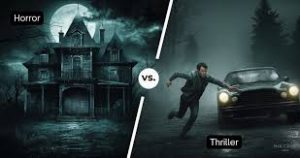Explore the key differences between psychological thrillers and action thrillers, from storytelling and pacing to emotional impact. Which one suits your thrill-seeking taste?
The Art of the Thrill
Thrillers have long captivated audiences by delivering suspense, excitement, and high stakes. However, not all thrillers are created equal. Two subgenres often confused—but fundamentally different—are psychological thrillers and action thrillers.
Whether you’re a fan of mind games or explosive chase scenes, understanding what sets these genres apart can elevate your appreciation for each. This article dives deep into the contrasts between psychological and action thrillers—from storytelling styles to audience impact—so you’ll never mix them up again.
Understanding the Core of Each Genre
What is a Psychological Thriller?
A psychological thriller is a genre that places emphasis on the unstable emotional and mental states of its characters. Rather than relying on physical confrontations or spectacle, these stories delve into mind games, moral ambiguity, and internal conflict.
Key Elements:
- Complex characters with layered personalities
- Themes of paranoia, guilt, or identity crisis
- Twists that challenge the viewer’s perception of reality
- Slow-burning suspense rather than rapid-paced action
Examples:
- Gone Girl (2014)
- Black Swan (2010)
- Shutter Island (2010)
What is an Action Thriller?
Action thrillers are all about physical excitement and adrenaline. These films and stories revolve around life-or-death stakes with fast-paced scenes, stunts, and combat.
Key Elements:
- High-octane sequences (chases, fights, explosions)
- A clear protagonist vs antagonist structure
- Time-sensitive missions or threats
- Linear storytelling with a climactic resolution
Examples:
- John Wick series
- Mission: Impossible franchise
- The Dark Knight (2008)
Storytelling Styles and Narrative Structure
Non-Linear vs Linear Narratives
Psychological thrillers often employ non-linear storytelling, using flashbacks, unreliable narrators, and fragmented timelines to reflect a character’s mental state. Action thrillers typically follow a linear path, focusing on cause-and-effect events leading to a climactic showdown.
Character-Driven vs Plot-Driven
Psychological thrillers are character-driven. The conflict is often internal or interpersonal, with an emphasis on how characters perceive and interact with their environment. Action thrillers, by contrast, are plot-driven—the character’s development is often secondary to the unfolding events.
Emotional and Psychological Impact on Viewers
Psychological Investment
Viewers of psychological thrillers are often mentally engaged, piecing together clues, second-guessing characters, and processing abstract themes. These films provoke introspection and discussion, often lingering in the viewer’s mind long after the credits roll.
Physical Stimulation
Action thrillers stimulate through visual and auditory intensity. They trigger the body’s “fight or flight” response—fast heartbeats, adrenaline rushes, and edge-of-your-seat anticipation.
Cinematic Techniques and Aesthetic Differences
Mood and Tone
- Psychological Thrillers: Use dim lighting, muted color palettes, close-ups, and eerie soundscapes to reflect internal unease.
- Action Thrillers: Feature bright lighting, vivid contrasts, and dynamic camera angles to highlight movement and urgency.
Editing and Pacing
- Psychological Thrillers: Slow, deliberate editing to build tension and suspense.
- Action Thrillers: Fast cuts, rapid pacing, and explosive transitions to maintain momentum.
Bollywood vs Hollywood: Cultural Adaptations of Thrillers
Both Bollywood and Hollywood have put their unique spins on thrillers, especially in how they blend the psychological and action elements.
Bollywood’s Approach
Bollywood thrillers often integrate emotional depth and social commentary. Films like Talaash or Andhadhun explore psychological nuances while maintaining elements of mystery and drama.
Hollywood’s Signature Style
Hollywood leans into high production value, minimalistic storytelling, and genre blending—mixing thrillers with horror, sci-fi, or crime elements. Movies like The Silence of the Lambs or Fight Club are prime examples.
The Psychology of Engagement: Why We Love Both
The Role of Dopamine and Endorphins
Thrillers tap into our brain’s reward system. Action thrillers stimulate dopamine, giving us bursts of excitement. Psychological thrillers engage deeper, triggering endorphins by making us think, solve puzzles, and experience emotional resonance.
This ties into broader human behavior: we crave stories that reflect both our primal survival instincts (action) and our higher cognitive functions (psychological intrigue).
The Future of Thrillers in the Age of AI and Data
With the rise of AI, data analytics, and content personalization, thriller genres are becoming more targeted. Streaming platforms use behavioral data to recommend specific subgenres, optimizing for user engagement.
Imagine AI-generated scripts that adapt a thriller’s tone and pace to match your psychological profile. The future of storytelling lies in hyper-personalized content, blending the adrenaline of action and the intellect of psychological drama seamlessly.
Which Thriller Is Right for You?
If you love exploring the human mind, grappling with ethical dilemmas, and savoring psychological tension, psychological thrillers are your go-to. If you’re in it for explosions, chases, and intense showdowns, then action thrillers deliver the punch.
Ultimately, both genres offer something invaluable: an escape, a challenge, and an experience. By understanding what sets them apart, you become a more informed viewer—and perhaps even a better storyteller.
FAQ: Psychological Thrillers vs Action Thrillers
Q1: Can a movie be both a psychological and an action thriller?
Yes. Some films blend elements of both genres. For example, The Dark Knight has the fast pace of an action thriller but also delves into the psychological battle between Batman and the Joker.
Q2: Are psychological thrillers scarier than action thrillers?
They can be. Psychological thrillers often evoke a deep, lingering fear rooted in realism and human nature, while action thrillers lean more toward suspense and excitement.
Q3: Which genre is more popular today?
Popularity fluctuates. However, action thrillers tend to dominate box offices globally due to their visual appeal, while psychological thrillers often find success through streaming and critical acclaim.
Q4: What’s the best way to start exploring psychological thrillers?
Start with critically acclaimed films like Prisoners, The Sixth Sense, or Gone Girl. These offer compelling narratives without being too abstract.
Q5: How are thrillers evolving with technology?
AI and data analytics are shaping how thrillers are made and consumed. Expect more personalized experiences, interactive storytelling, and AI-enhanced content development in the near future.
If you’d like, I can also format this as a downloadable blog post or upload-ready HTML file. Want that?
